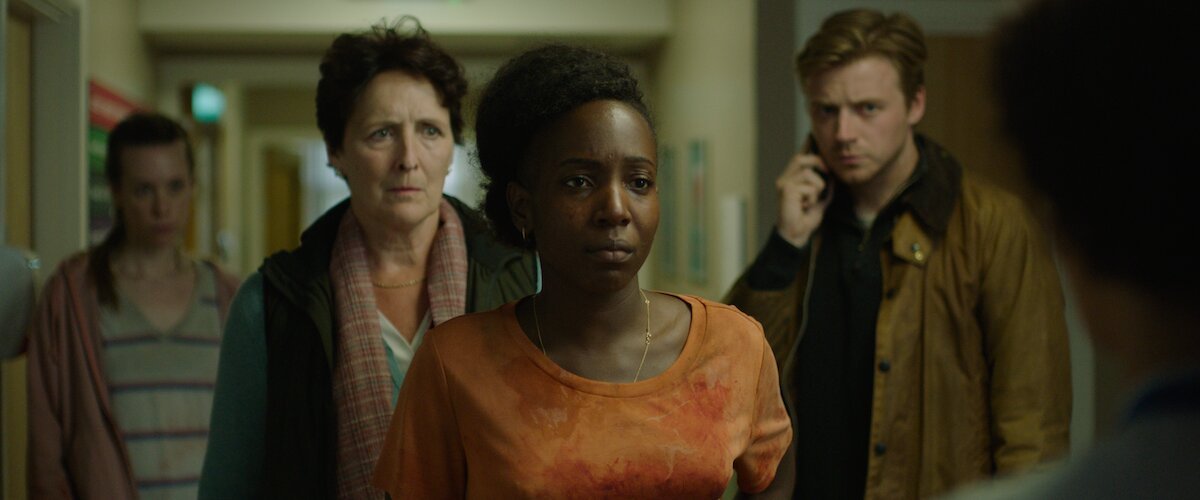The Ties That Bind, by Reed Lackey
8 Nov

Releasing this week on most VOD platforms is a strong and haunting story of a woman’s struggle to maintain her agency and her sanity as she wrestles with sudden grief and the apparent threat of indefinite captivity. Kindred is the debut feature from director and co-writer Joe Marcantonio and starring Tamara Lawrence, Fiona Shaw, and Jack Lowden. It owes an immediate and apparent debt to Rosemary’s Baby, but manages to forge its own unique path with some deliberate shifts in key elements.
The story begins when Charlotte (Lawrence) and Ben (Edward Holcroft) commit to expressing their desire to start a new life together far away from his domineering mother and their substantial estate. Not long after they have announced the devastating news, they discover that they will soon be parents, which throws tremendous uncertainty into their plans for the future. Things then take on a horrific turn when a sudden accident claims Ben’s life, leaving Charlotte under the care – and perhaps captivity – of his mother (Shaw) and stepbrother (Lowden).
What proceeds is a deliberately paced, steadily heightening tension between perception and reality as Charlotte struggles to cope with the loss of her love and the new pressure being placed upon her choices for her unborn child by his family. It is not immediately apparent whether Ben’s family has ill intentions for Charlotte or whether they are merely seizing an opportunity to keep his memory in their life through his child, which raises some fascinating questions about the degree to which different people coping with comparable losses are entitled to the fulfillment of their own needs when they conflict with each other’s. Charlotte expresses her frustration when boundaries are over-stepped, but yields when the shared loss becomes the central focal point of the conflict.
The fact that Charlotte is also a person of color adds a layer of thematic complexity which Marcantonio resists emphasizing. Charlotte’s identity is contextualized within the family as Ben’s lover and the mother of his child, without concern for her racial identity. However, what she struggles through creates its own subtext for us, the viewers, as she continually fights for her own freedom and the right to raise her child as she sees fit in a community in which all authority and resources bend in support of the intentions of her mother-in-law. This helps, though not exclusively, Kindred to distance itself from the similar stories which have so obviously influenced it by allowing us to see Charlotte’s plight as a metaphor for both racial injustice and maternal agency.
The film also resists any inclusion of supernatural forces at play, save for one harrowing scene near the end, which could be interpreted as a product of Charlotte’s fractured perception as much as an intervention of supernatural malevolence. Because by the time Charlotte has finally broken free of the confines of her condition and grasped her own liberty, even utterly natural forces appear to conspire against her.
The rest of the production is bright and spacious, contrasting the steadily rising sense of dread and helplessness that accompanies its narrative beats. Even when we are aware of key threats before Charlotte is, this choice leaves room for hope that perhaps things are not as bleak as Charlotte fears, except and until the times when she finds out that they truly are that dire.
The performances are subtle and committed, without an ounce of pretense to any of them. Shaw embodies the controlling matriarch with chilling efficiency, though not without the requisite amount of sympathy to help us understand why she’s able to be coercive. Lawrance, whose performance anchors the entire film, delivers a wonderfully restrained performance which allows us to sense every inch of the turmoil within her without overly telegraphing what we’re supposed to conclude about the reality of her predicament. We are often as uncertain as she is whether or not she should be afraid by what’s happening, and all we are convinced of until the final scene is that her agency is being compromised, whether out of an overzealous sense of her protection or an oppressive desire to control her destiny. The supporting players, each in turn, all deliver strong performances at their best and firmly competent at their weakest, but it is Shaw and Lawrance who truly shine in this presentation.
Kindred is a road cinematic audiences have traveled before, but a savvy script, committed performances, and some refreshing narrative and thematic choices make it feel like we’re driving down a familiar highway, but in a nice, shiny new vehicle.



No comments yet